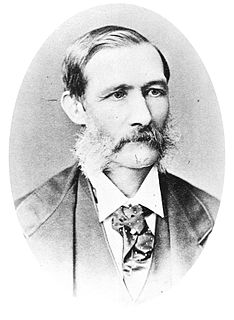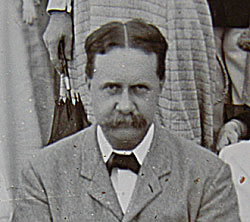
Bankim Chandra Chatterjee or Bankim Chandra Chattopadhyay, CIE was an Indian novelist, poet and journalist. He was the composer of Vande Mataram, originally in Sanskrit, personifying India as a mother goddess and inspiring activists during the Indian Independence Movement. Chattopadhyay wrote fourteen novels and many serious, serio-comic, satirical, scientific and critical treatises in Bengali. He is known as Sahitya Samrat in Bengali.

The Most Eminent Order of the Indian Empire is an order of chivalry founded by Queen Victoria on 1 January 1878. The Order includes members of three classes:
- Knight Grand Commander (GCIE)
- Knight Commander (KCIE)
- Companion (CIE)

Sir Ashutosh Mukherjee was a prolific Bengali educator, jurist, barrister and mathematician. He was the first student to be awarded a dual degree from Calcutta University. Perhaps the most emphatic figure of Indian education, he was a man of great personality, high self-respect, courage and towering administrative ability. The second Indian Vice-Chancellor of the University of Calcutta for four consecutive two-year terms (1906–1914) and a fifth two-year term (1921–23), Mukherjee was responsible for the foundation of the Bengal Technical Institute in 1906, which was later known as Jadavpur University and the University College of Science of the Calcutta University in 1914.

Sir Dietrich Brandis was a German-British botanist and forestry academic and administrator, who worked with the British Imperial Forestry Service in colonial India for nearly 30 years. He joined the British civil service in Burma in 1856, shortly afterwards became head of the British forestry administration in all of Burma, and served as Inspector General of Forests in India from 1864 to 1883. He returned to Europe in 1883, dividing his time between Bonn and Greater London. In retirement he dedicated himself to scholarly work, resulting in the book Indian Trees (1906), his magnum opus. Brandis is considered the father of tropical forestry and has also been described as the father of scientific forestry. In addition to his work in India, he also had a significant influence on forest management in the United States.

Sir William Wilson Hunter was a Scottish historian, statistician, a compiler and a member of the Indian Civil Service.

The Bengal Presidency, officially the Presidency of Fort William and later Bengal Province, was a subdivision of the British Empire in India. At the height of its territorial jurisdiction, it covered large parts of what is now South Asia and Southeast Asia. Bengal proper covered the ethno-linguistic region of Bengal. Calcutta, the city which grew around Fort William, was the capital of the Bengal Presidency. For many years, the Governor of Bengal was concurrently the Viceroy of India and Calcutta was the de facto capital of India until 1911.
Sir Charles James Lyall (1845–1920) was an Arabic scholar, and English civil servant working in India during the period of the British Raj.
Sir John Henry Kerr was a colonial governor in British India

Sir Ashley Eden was an official and diplomat in British India.
Sir Frederick William Duke was a Scottish civil servant of the Indian Civil Service and formulated the Duke Memorandum during the period of constitutional reform in India.

Sir Richard Carnac Temple, 2nd Baronet, was an Indian-born British administrator and the Chief Commissioner of the Andaman and Nicobar Islands and an anthropological writer.

Bhudev Mukhopadhyay (1827–1894) was a writer and intellectual in 19th century Bengal. His works were considered ardent displays of nationalism and philosophy in the period of the Bengal renaissance. His novel "Anguriya Binimoy" (1857) was the first historical novel written in Bengal.

Sir Alexander Mackenzie, was a British colonial official in India, who served as Chief Commissioner of the British Crown Colony of Burma from 1890 to 1895, and as Lieutenant-Governor of Bengal from 1895 to 1898.

Sir Alexander Phillips Muddiman was a British administrator in India.
William Christopher Wordsworth CIE was a British academic and journalist in India.
Sir Edward Albert Gait (1863–1950) was an administrator in the Indian Civil Service who rose to serve as Lieutenant-Governor of the Bihar and Orissa Province in the Bengal Presidency of British India. He held that office for the years 1915–1920, with a brief absence during April–July 1918 when Edward Vere Levinge officially acted in the position.

Sir Alexander Pedler was a British civil servant and chemist who worked in the Presidency College, Calcutta where he influenced early studies in chemistry in India by working with pioneer scientists like Prafulla Chandra Ray. He helped found the Indian Association for the Cultivation of Science in Calcutta which in its early days was involved in reaching out to lay citizens interested in science.

Maharajadhiraja Bahadur Sir Bijay Chand Mahtab, was the ruler of Burdwan Estate, Bengal in British India from 1887 till his death in 1941.

Raja Sourindra Mohun Tagore or Sourindro Mohun Tagore CIE was a Bengali musicologist who came from an upper-class family from Bengal region of the Indian subcontinent; that also later produced Rabindranath Tagore. He studied both Indian and western music theory and published extensively on the topics. He founded the Bengal Music School and Bengal Academy of Music. A staunch supporter of the British Empire and its agencies in India, he was commissioned to set Indian translations of God Save the Queen to Indian tunes.
Archdale Earle, C.I.E., K.C.I.E. (1861-1934) was a British Indian administrator and former Chief Commissioner of Assam Province.













